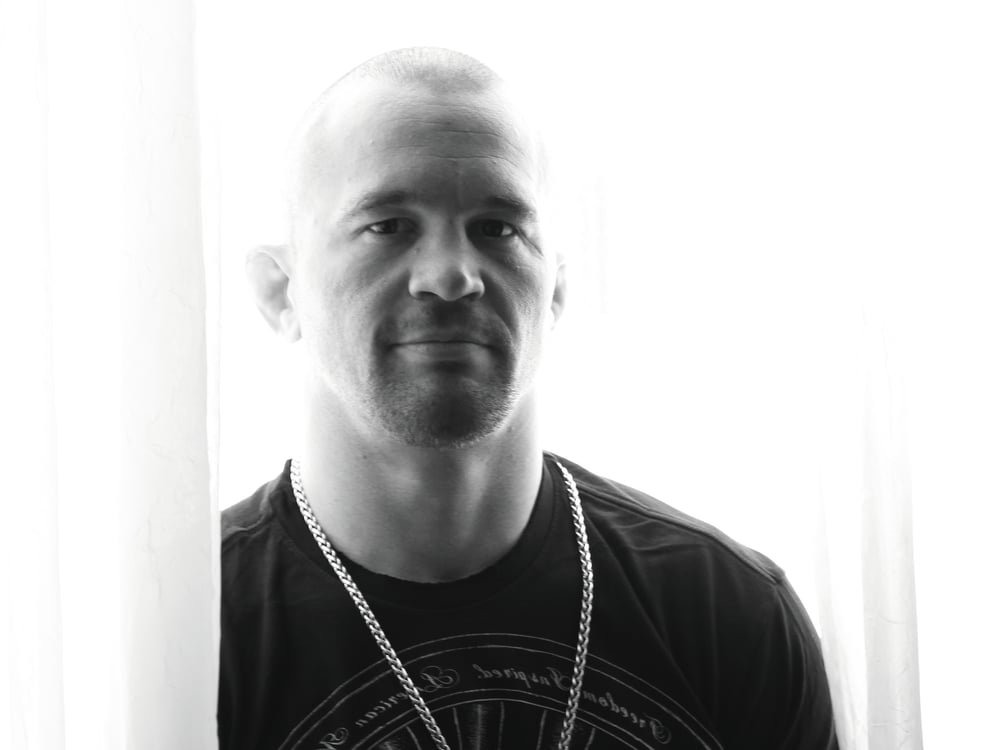
Issue 071
January 2011
Chris Lytle is MMA’s ‘Fight of the Night’ bonus king. Plus he digs even deeper for his role as a full-time firefighter and dad of four
As UFC welterweight Chris Lytle made the long walk from the dressing room to the cage at Indianapolis’ Conseco Fieldhouse, he felt something disturbingly different welling up inside. Making his way to the Octagon for the 18th time in his career, Lytle received an overwhelming show of support from nearly every one of the 15,811 attendees gathered to witness ‘Lights Out’ and former UFC welterweight champion Matt Serra battle at UFC 119. But even with the adrenaline coursing through his veins that only comes from fighting in your hometown, Lytle realized something was amiss. He was nervous. “It was definitely different,” Lytle says. “There’s a lot more… I guess pressure is the right word. You don’t want to go out there and not perform well when everybody you know is there – all the people who always talk about wanting to watch you fight but can never travel around the country to see it. Lots of times, if you go someplace and you fight, whether you win or you lose, a lot of people don’t know about it. They just hear about it later. This fight, you know everybody is around, and they see and know what’s going on. It’s a big deal. You definitely don’t want to lose this fight or not fight well.”
Fortunately for Lytle and the hometown crowd, the former professional boxer battered Serra on his feet for three rounds en route to a clear-cut unanimous decision win. It was sweet revenge for Lytle, who lost an infamous split decision to Serra in November 2006 at the live finale of The Ultimate Fighter 4. Adding to the thrill of the moment, the win was Lytle’s fourth-straight victory, matching the longest-such streak of his 12-year career. Alas, there was precious little time to celebrate. After all, there were toilets to clean.
A married father of four, Lytle is a rarity in modern mixed martial arts. To earn a respectable in the early days of the sport meant that maintaining a full-time job outside of fighting was a necessity. And, as the sport’s evolved, most competitors at the UFC level believe they can’t afford to deal with the distractions of a life outside of the cage. Not so for Lytle, who has maintained his position as a firefighter for nearly ten years. “Immediately when I got out of college and got a ‘real job,’ it was very evident that I didn’t have it in me to sit in an office,” Lytle says. “To do that nine-to-five work in a regular job, I would have gone nuts. I’ve always done a lot of high-adrenaline-type activities anyway, so the fire department was a good fit. It turned out to be the perfect situation for me. I like going to work. I like being there. It’s an entertaining job – very high-adrenaline – and you get a lot of time out to train. It works good.”

Lytle insists the contrast between fighting fires and fighting fellow 170lb’ers helps keep his life in proper balance. “There are certain times when I would like to have more time to dedicate to training, like other guys, but doing both helps me out,” he says. “I think a lot of guys tend to not have any balance in their lives. It’s all fighting or all something else. And I think a lot of guys in the fighting industry, they believe in the hype about themselves and just get caught up in it. But it’s hard to really think you’re some big tough-guy badass and better than everybody else then you go to work one day, and they’re like, ‘Alright, Chris. Today you’re mopping floors and cleaning toilets.’ It’s kind of hard for me to think I’m a badass at that point.”
Beyond the menial tasks of running a firehouse, Lytle says his duty to the community often serves as a harsh reminder of the reality that exists outside of the Octagon. “Just going into houses where you see the less fortunate people and the things they’re dealing with, it’s very eye-opening,” Lytle says. “Say you have to help up an elderly person who can barely take care of themselves. They fell and hit their head and are bleeding, and you’re trying to take care of them. That’s humbling. You see what’s really important. Most people aren’t caught up in superficial things. Keeping my job as a firefighter has been nothing but very helpful for me to put everything in the proper perspective. I really appreciate what fighting has done for me, and I really just appreciate the sport itself. I think a lot of people don’t get that.”
Lytle also has a penchant for nabbing something else that a lot of people don’t get: the UFC’s ‘Fight-Night’ bonuses. While Lytle’s 2006 loss to Serra saw his official Octagon record fall to just 2-5 at the time, the tepid nature of the contest served as a wake-up call of a different sort. “Both Matt and I went out there with the mentality that, ‘I don’t want to lose this fight.’” Lytle says. “We went out there and fought very conservatively. He pushed me into the fence a lot, and I just sat there and pitter-pattered him with little shots. I was afraid to go for too much, and I think he was, too. At the end, I lost a split decision, so I didn’t get anything out of it. I didn’t get my title shot, and I didn’t fight the way I wanted. I had a realization that I can’t control the way the judges are going to look at the fight, but I can always go out there and try and finish the fight no matter what. At least if I go out there and try and do that, no matter whether I win, lose or draw, I’ll know I went out there and fought the way I wanted to. There’s nothing worse than losing a fight and not fighting the way you wanted to.” With his newfound approach to fighting, Lytle has now gone 7-3 in his past ten UFC contests, and he’s netted an astounding seven ‘…of the Night’ bonuses (including an unprecedented three-straight ‘Fight of the Night’ awards between 2008 and 2009) totaling an impressive $310,000.
So how has the extra money changed Lytle’s life? Fast cars? Custom-tailored wardrobe? Bling? “I’ve got four kids,” Lytle said. “A Lamborghini is out of the question right now. I’ve taken some family vacations and stuff like that, but I’m getting old. I’m thinking about things like paying off my house. I’ve got a few rental properties, and I’m just trying to be smart with my money. A lot of people don’t understand that money wasn’t around this sport the whole time. I remember a lot of times fighting for peanuts. Now that I’ve got a chance to make some money, I’m trying to make it last.”

For longtime fans of the UFC, Lytle is a familiar face. He debuted for the organization more than a decade ago at UFC 28, the same night that Andrei Arlovski, Josh Barnett and Renato ‘Babalu’ Sobral also made their first Octagon appearances. The soft-spoken slugger has evolved tremendously since those early days, but he knows his current winning streak may be one of his last. “I know 36 years old sounds bad enough, but in all reality, I’ve had probably 80 fights in my career, counting boxing and MMA,” Lytle says. “I know what they have my record as, but that’s not even close to correct. I’ve been fighting since 1998. A lot of my fights aren’t even on my record. They didn’t even turn in the results back then. I’ve had close to 80 fights, so I think that’s probably an even more telling factor than my age. I have a lot of injuries. I’ve got a lot of pain and a lot of things that ‘don’t work’ right now. I definitely look at the big picture, and I’m definitely in the twilight of my career.” Yet Lytle is currently fighting better than ever, and another win or two could merit real talk of a welterweight title fight. The constantly improving Lytle says a shot at the belt is why he continues to compete, but he promises not to hold on too long. He’s got a loving family and a waiting firehouse to eventually ease his transition out of the fight game. “I’m not going to be one of these guys you’ll see later in his career sticking around and fighting where you’re like, ‘Man, you’re going to get knocked out, please stop,’” he says. “Some of these guys keep coming back around, and I know it’s hard when you don’t have much else going on in your life. That’s why I feel very happy that I do have the fire department and my family to keep me occupied and busy. For now, I really do enjoy doing this, and I love it, but when I think the time is over, I’m not going to do it anymore.”
And when he does, Lytle will leave behind a blue-collar legacy that already includes nearly 20 UFC fights and a career that began when the sport was still known as ‘no holds barred’. “There’s no magic bullet, and there’s no shortcut to getting where you want to get,” he says. “The only way to be successful is hours and hours and hours of hard work. That’s what it is. It might be fun, but it’s hard work. A lot of people are just looking for easy answers and an easy way to make this happen. You’ve got to put in the hours. That’s the only way to succeed in this sport.”
...









